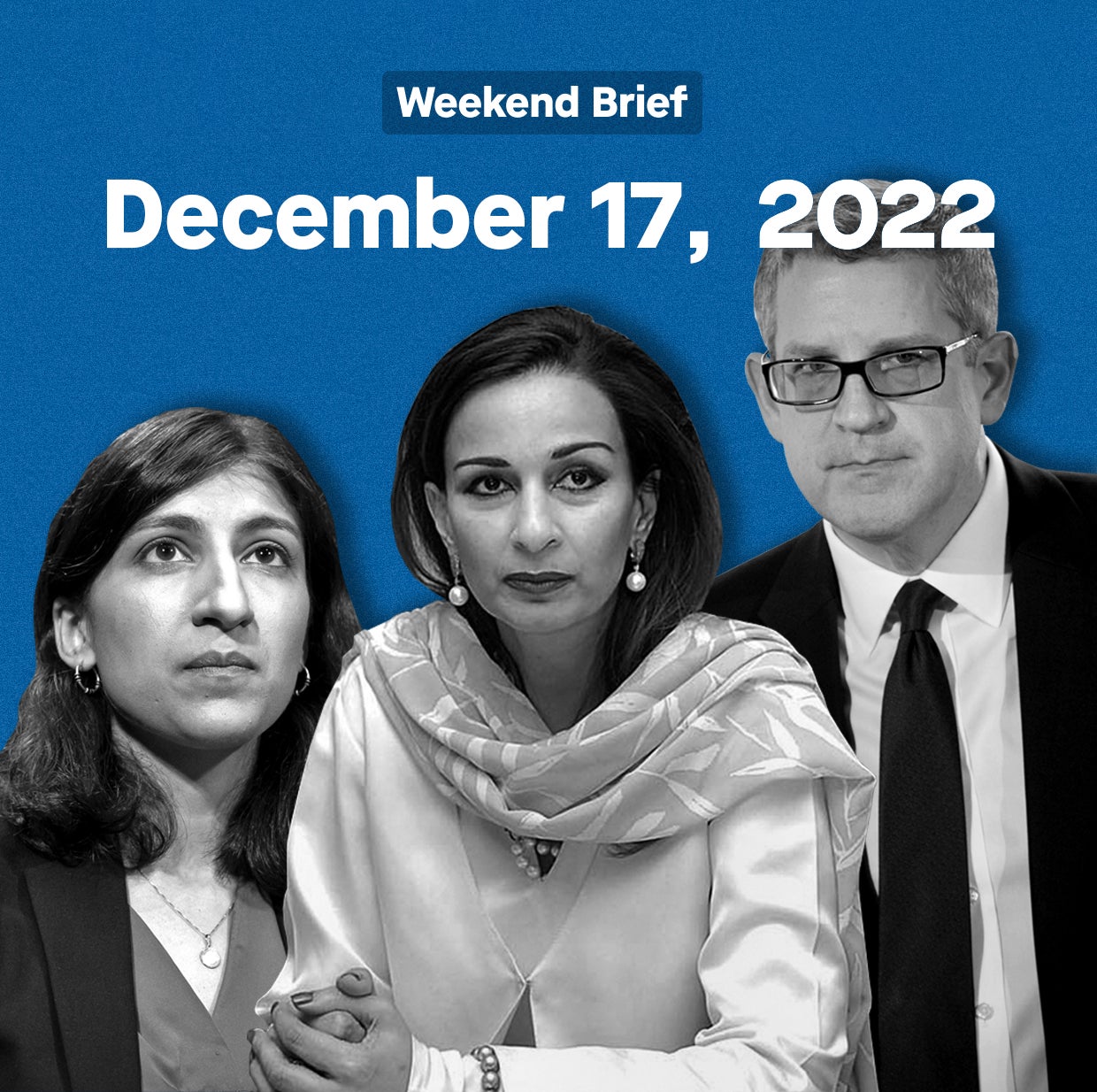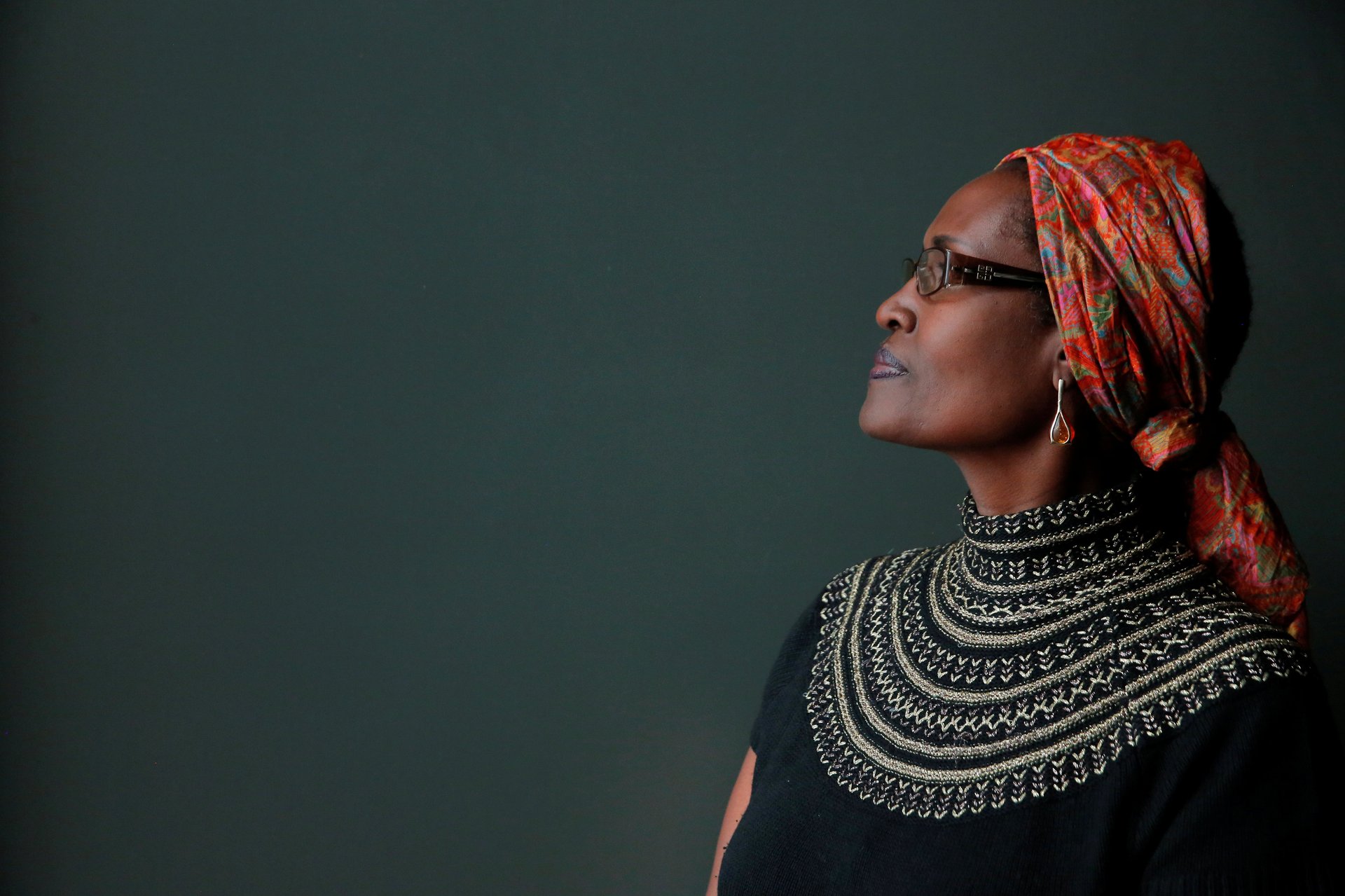Quartz's Unheralded People of the Year
Six individuals who shaped the world powerfully in 2022—without hogging the headlines in the process


Hi Quartz members,
It’s easy to forget, sometimes, that there are people behind the momentous events of our age who aren’t blindingly, perennially visible—who aren’t the face and voice of the world’s most influential monetary policy, say, or who cannot afford to turn a social media platform into a personal megaphone.
As 2022 thunders to its finish (no gentle winding down for this beast of a year), Quartz’s journalists have picked six men and women whom you haven’t read enough about, and who all had an outsized or unexpected impact on the past 12 months. Keep your eyes on them in 2023; they aren’t done yet.
THE TRUSTBUSTER: Lina Khan
When Lina Khan was named chair of the Federal Trade Commission (FTC) in 2021, her reputation preceded her. Khan’s 2017 study looking at the dangers of Amazon’s unchecked market dominance had become fundamental reading for anyone interested in how monopolies are built—and how they ought to be handled.
But a year into Khan’s term, the shine had started to fade. In March, Amazon completed an $8.5 billion acquisition of the movie studio MGM, widely seen as a setback for the FTC. Observers wondered whether Khan’s bite was as sharp as her bark.
Then, in May, the appointment of a new commissioner to the FTC swung its majority towards the Democrats, giving Khan more space for action. Since then, the FTC has taken on Meta’s acquisition of the VR startup Within; has sued to block Microsoft’s $69 billion takeover of Activision Blizzard; and was called upon to investigate Elon Musk’s handling of data security at Twitter following his $44 billion acquisition.
It’s not just about going after Big Tech. US regulators are now pursuing a wider interpretation of antitrust violations that considers risks such as limits to buyer’s choice, industry innovation, and competition. This approach lost the FTC a bid to block the $7.1 billion merger of Illumina and Grail, but scored a win for the Department of Justice in its lawsuit against Penguin Random House’s $2.2 billion acquisition of Simon & Schuster. Now it threatens the Kroger-Albertson megamerger.
Ultimately, Khan thinks consumers will see for themselves the wisdom of her ways. Commenting on the Taylor Swift Ticketmaster fiasco, Khan quipped that it “converted more Gen Z-ers into antimonopolists overnight than anything I could have done.”
—Sofia Lotto Persio
THE MINISTER: Sherry Rehman
🌊 When Pakistan was inundated by devastating floods in August, Sherry Rehman, the country’s climate minister, helped push the tragedy into international headlines with her shocking, evocative report that “literally a third” of Pakistan was under water. Then she deftly parlayed the disaster into a concrete policy objective. She framed her country’s plight in terms of debt and the inequity of bearing the financial burden of climate change, to which Pakistan has contributed minimally. “What is needed, given today’s pace of change, is a tripling of the climate financing targets,” she wrote.
💰 Weeks later, Rehman was instrumental in the biggest success of the COP27 climate summit in Egypt. At her insistence, “loss and damage”—payments by rich countries to developing ones to cover the costs of climate impacts—was included on the COP agenda for the first time in 30 years. Diplomats from the global north agreed to create a fund to collect and distribute such payments. Rehman’s passion and persistence were singularly responsible for that breakthrough. Scottish first minister Nicola Sturgeon wrote in the Financial Times: “Her moral authority led to the ground-breaking agreement that has given renewed hope to many in the global south.”
✍️ Rehman doesn’t come from a climate background per se. She was a TV and newspaper journalist for 20 years before winning a seat in the National Assembly in 2002. She has focused on women’s rights and religious freedom during most of her political career, and as ambassador to the US, she pressed the Obama administration to end drone strikes in Pakistan.
—Tim McDonnell
THE DUKE: Edward Fitzalan-Howard
The most-watched pageantry of the year was organized by someone who’d spent 20 years preparing for the big moment.
Within the British aristocracy, Edward Fitzalan-Howard’s title—the Duke of Norfolk—is the highest dukedom in the land. As the Earl Marshal, responsible for coordinating the opening of parliament, Fitzalan-Howard is also in charge of organizing big monarchical events.
His grandfather put together Queen Elizabeth II’s coronation in 1953. Fitzalan-Howard, who inherited the title in 2002, was given the task of assembling the royal funeral—an inevitable event, and one that called for detailed, careful planning. He started the process, he told the Times, the very week he came into his title. Back then, there were roughly 20 attendees at the annual meetings to review the plans; this past April, though, there were 282 people, all on a video call.
The world had changed so much since the last royal funeral, seven decades earlier, that Fitzalan-Howard had an endless parade of novel challenges. Would security allow the Queen’s coffin to travel from Edinburgh to London by train? How many people could they fit inside Westminster Abbey, hosting its first state funeral in 200 years? How long could the Queen lie in state so as to give as many mourners as possible the chance to queue up and pay their respects? Which road would best get Fitzalan-Howard from Westminster Abbey to Windsor Castle ahead of the coffin? Everything had to be signed off by the then-still-Prince Charles and Fitzalan-Howard. “The buck stops with me,” he said.
Fitzalan-Howard’s father, a veteran of World War II, had told him: “I organized the crossing of the Rhine in 24 hours—the Queen’s funeral will be a piece of cake.” Perhaps that wasn’t quite correct. In any case, having pulled off the funeral without a hitch, Fitzalan-Howard now has another task at hand: putting together King Charles III’s coronation next year.
—Samanth Subramanian
THE CRUSADER: Winnie Byanyima
One of the ways in which humanity failed most spectacularly in the face of covid was in its lack of solidarity. On a global scale, this manifested egregiously in vaccine inequality: After lofty promises, rich countries only took care of their own, leaving the global south scrambling for leftovers. To protect their financial interests, big pharmaceutical companies trotted out the same myths they’d used to prevent access to lifesaving AIDS drugs.
For a while now, global health experts—in particular those from low- and middle-income countries, or working outside the global centers of power—have been decrying the inequality permeating their field. This year, Winnie Byanyima, the UN under-secretary-general who heads UNAIDS, the initiative to tackle the AIDS epidemic, publicly called out the reason behind the lopsidedness in global health: racism.

Byanyima chose the belly of the beast to deliver her message, describing the way racism is entrenched in global health and the economic system while speaking at the World Economic Forum in Davos, which she had co-chaired in 2014. This year, in her speech, she described the global response to covid as racist, calling it a form of “policy violence.”
The condemnation of such dynamics should hardly be controversial or groundbreaking, but it is. Byanyima’s willingness to be outspoken while representing a high diplomatic body has offered an important opportunity to elevate the need to “decolonize global health” and to reform its institutions.
—Annalisa Merelli
THE JOURNALIST: Ian Allison
It isn’t every day, or even every year, that a journalist launches a bank run, reveals a multi-billion dollar fraud, and (TBD) brings down an entire economic sector. Ian Allison, a UK-based reporter at Coindesk, did just that on Nov. 2, when he reported details of the balance sheet of crypto-evangelist Sam Bankman-Fried’s hedge fund Alameda Research.
Alameda held an extraordinary quantity of FTT tokens, created by the exchange FTX, also owned by Bankman-Fried. It showed, Allison wrote, that “trading giant Alameda rests on a foundation largely made up of a coin that a sister company invented, not an independent asset.” When a rival crypto mogul read Allison’s story, he announced a fire sale of those tokens. FTX customers raced to pull assets from the exchange, and the whole house of cards collapsed.
The bankruptcy revealed that Bankman-Fried had allegedly stolen some $8 billion from his customers. Prosecutors and regulators are lining up to sort through the mess, while other exchanges are collapsing or suffering runs of their own. The scoop even hit close to home: Coindesk is owned by a crypto-focused company that has suffered real losses as coin prices plunged.
Allison’s editor, Nick Baker, said he had “no expectation that [the story] was going to be that gigantic.” Reporters never can tell what kind of impact a scoop will have, but it is safe to say this will prove to be an inflection point for crypto. Bankman-Fried’s alleged fraud might have been exposed eventually, but Allison got there first.
—Tim Fernholz
THE COACH: Walid Regragui
When Walid Regragui took charge of the Moroccan soccer team at the end of August, he wasn’t given an easy ride. He had barely three months until the FIFA World Cup began in Qatar. The team’s stars, Hakim Ziyech and Noussair Mazraoui, had fallen out with the country’s soccer authorities. To boot, Regragui’s defense-first style of play had plenty of critics. Only one Moroccan had coached the national side before, and he’d done badly; his team lost all three games in the 1994 World Cup. The Moroccan press didn’t give the bald Regragui much hope, dubbing him “avocado head” in faint derision.

How swiftly Regragui’s fortunes changed. He engineered the return of Ziyech and Mazraoui, and he earned the faith of his players. Then he impelled his team through a difficult group stage and up the tournament’s ladder. Morocco became the first-ever African country to reach a World Cup semifinal, losing out finally to France, its former colonizer.
Remarkable, too, was the sudden geopolitical solidarity that Morocco managed to conjure up with its success. When Regragui’s players beat Spain to qualify for the quarterfinal, they were cheered on by Africans and Arabs alike. For the duration of its dream run, Morocco became not so much a country torn between two continents as one uniting them.
Regragui did it all without changing his coaching manual. “A lot of Europeans have criticised our style of play but that is because they don’t like to see an African team play cleverly,” he told reporters. “They think African teams used to be fun but get knocked out. But those days are over now. There isn’t just one way of winning.”
—Samanth Subramanian
QUARTZ STORIES TO SPARK CONVERSATION
- How an MSG seasoning company became a serious player in the semiconductor industry
- These algorithms could be getting between you and your next job
- New Zealand’s new cigarette law is fighting the wrong war
- Elon Musk’s confusing rationale for suspending @ElonJet
- How a Georgia company grew the grass for the World Cup—and then flew it to Qatar
- Chinese insurers are getting nervous about the country’s covid surge
- If Europe’s carbon tariff works, consumers might not even notice it
5 GREAT STORIES FROM ELSEWHERE
✊ Body snatchers. Google is trying to get its hands on millions of human skin samples. ProPublica investigates the tech giant’s efforts to access the Joint Pathology Center (JPC), which contains over 100 years’ worth of preserved tissues from US veterans. The archive, if digitized, could not only lead to medical breakthroughs, but also become a money-making machine. At least, that appears to be Google’s goal—but ethical and legal concerns abound.
🦠 Art on agar. Turns out your moldy bread can also be molded into art. Since 2015, the American Society of Microbiology has held a global microbial art competition where participants ranging from scientists to kids use the living medium to create paintings on agar gel. Popular Science tells the story of this invisible artform that blooms into existence, and can produce unexpected results as organisms interact on the canvas.
🎄 A prickly trade. The Christmas tree business in New York City is fierce. Come December, lower and upper Manhattan are carved into spheres of evergreen influence, staked out by a handful of formidable tree bosses. Curbed paints a portrait of the colorful characters engaged in the Big Apple’s tree-selling hustle, which is a lot less about spreading joy and cheer and a lot more about sabotage, intrigue, and in one instance, murder.
👜 Humble bag. The canvas tote bag, a cool yet understated cultural signifier, has a storied history. It dates back to the 1880s, according to a piece from The Walrus, but didn’t gain widespread popularity until the 1940s when brands realized they could function as mobile advertising. Today, the literary tote bag has become a subtle flex, demonstrating you’ve got access to spaces, places, or subscriptions, but without the highfalutin’ feel of a designer purse.
✍️ Wretched words. The Bulwer-Lytton Fiction Contest, named after the author who penned the famous opening line, “it was a dark and stormy night,” is an annual competition dating back to 1982 that tests who can write the worst first sentence to an even worse novel. This year’s winner was perfected rubbish, but the “dishonorable mentions” and other categories feature drivel deserving of high praise, and are well worth a read.
Thanks for reading! And don’t hesitate to reach out with comments, questions, or topics you want to know more about.
Weekend Brief will return on Dec. 31. In the interim, have a warm and joyous couple of weekends,
— Samanth Subramanian, global news editor; Sofia Lotto Persio, deputy news and email editor; Tim McDonnell, senior reporter; Annalisa Merelli, senior reporter; and Tim Fernholz, senior reporter.
Additional contributions by Julia Malleck